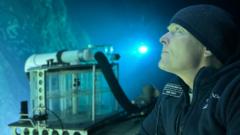David Lochridge, the whistleblower from Oceangate, speaks out following the implosion of the Titan submersible, which claimed the lives of five individuals during an expedition to the Titanic wreck in June 2023. Lochridge, who was terminated from his position within the company after raising serious safety concerns back in 2018, expressed his fears that the incident was a result of negligence regarding equipment safety.
Shortly before the Titan’s ill-fated dive, Lochridge had warned about the numerous issues associated with the vessel's design and construction, significantly criticizing the usage of carbon fiber for the hull, a material never before utilized in deep-sea submersibles. His reservations were largely ignored despite his extensive experience in marine operations and submarine rescue missions, which spanned over 25 years.
The June 2023 tragedy prompted a US Coast Guard report, indicating that Oceangate's lack of safety protocols and testing played a crucial role in the disaster. Lochridge emphasized that such oversight could have changed the outcome entirely. "There's a great deal that could have been managed differently, from the design phase all the way to operations," he remarked.
As the former Director of Marine Operations, Lochridge was initially optimistic about Oceangate's endeavors to create a commercially viable submersible. However, doubts began to surface in 2016, particularly when the company shifted design responsibilities from the University of Washington’s Applied Physics Laboratory to in-house engineers, raising concerns over their expertise.
Throughout the development process, Lochridge encountered numerous structural flaws and safety issues with the Titan, leading him to document and escalate his concerns. Unfortunately, his efforts to advocate for a safety assessment by an independent body were dismissed. After voicing these concerns, he was abruptly terminated, prompting him to file complaints with the Occupational Safety and Health Administration (OSHA).
Despite Lochridge's attempts to bring attention to these critical safety issues, OSHA's response was tepid, ultimately leading to legal disputes between him and Oceangate, which further complicated matters. The ramifications of Lochridge's battle have led him to believe that adequate government intervention could have altered the tragic fate of the Titan.
Despite the calamity, the US Coast Guard’s findings corroborate Lochridge's claims of systemic failures within the regulatory response. The timeline revealed lost communications between OSHA and the USCG that further delayed action on the whistleblower’s concerns.
Oceangate has since ceased operations and is cooperating with ongoing investigations, yet Lochridge remains firm in his belief that the company, along with government agencies, failed to uphold safety standards – a situation he believes could have been mitigated. "This tragedy could have been averted," he concludes.
Shortly before the Titan’s ill-fated dive, Lochridge had warned about the numerous issues associated with the vessel's design and construction, significantly criticizing the usage of carbon fiber for the hull, a material never before utilized in deep-sea submersibles. His reservations were largely ignored despite his extensive experience in marine operations and submarine rescue missions, which spanned over 25 years.
The June 2023 tragedy prompted a US Coast Guard report, indicating that Oceangate's lack of safety protocols and testing played a crucial role in the disaster. Lochridge emphasized that such oversight could have changed the outcome entirely. "There's a great deal that could have been managed differently, from the design phase all the way to operations," he remarked.
As the former Director of Marine Operations, Lochridge was initially optimistic about Oceangate's endeavors to create a commercially viable submersible. However, doubts began to surface in 2016, particularly when the company shifted design responsibilities from the University of Washington’s Applied Physics Laboratory to in-house engineers, raising concerns over their expertise.
Throughout the development process, Lochridge encountered numerous structural flaws and safety issues with the Titan, leading him to document and escalate his concerns. Unfortunately, his efforts to advocate for a safety assessment by an independent body were dismissed. After voicing these concerns, he was abruptly terminated, prompting him to file complaints with the Occupational Safety and Health Administration (OSHA).
Despite Lochridge's attempts to bring attention to these critical safety issues, OSHA's response was tepid, ultimately leading to legal disputes between him and Oceangate, which further complicated matters. The ramifications of Lochridge's battle have led him to believe that adequate government intervention could have altered the tragic fate of the Titan.
Despite the calamity, the US Coast Guard’s findings corroborate Lochridge's claims of systemic failures within the regulatory response. The timeline revealed lost communications between OSHA and the USCG that further delayed action on the whistleblower’s concerns.
Oceangate has since ceased operations and is cooperating with ongoing investigations, yet Lochridge remains firm in his belief that the company, along with government agencies, failed to uphold safety standards – a situation he believes could have been mitigated. "This tragedy could have been averted," he concludes.





















